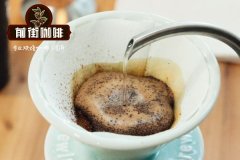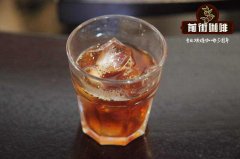Video of hand-brewing Coffee five techniques of Coffeecarrot Coffee extraction

Professional coffee knowledge exchange more coffee bean information please follow the coffee workshop (Wechat official account cafe_style)
How to simply flush out delicious coffee
High-quality handmade coffee tutorial video
Coffeecarrot coffee extraction
The dosage of powder is 20g.
300ml extract
Step1: first of all, pour the newly boiled water into the hand flushing pot and the sharing pot. After repeating two or three movements, the water temperature will drop to between 85 ℃ and 90 ℃. The water temperature not only reaches the extraction temperature we need, but also completes the warm pot, which can be said to kill two birds with one stone.
Step2: after powdering, pour a small amount of water into the filter cup and stew for about 30s.
Step3: be careful not to wash out the coffee powder on the wall of the filter cup and slowly pour water into the center of the filter cup.
Step4: the water level has dropped during the second water injection, pay attention to maintain the water level of coffee, and then carry out spiral water injection in the center of the filter cup.
Step5: when extracting 150ml, remove the filter cup in time, then add hot water (moderate temperature) to 300ml, stir the extract fully with the added hot water and drink it.
[matters needing attention in extraction]
1. Do not inject overheated water, Carrot stores use 87 ℃ of water temperature to extract medium-roasted coffee.
two。 Do not inject a large amount of water into the filter cup at once.
3. Don't let the water rush to the edge of the filter paper.
4. Please be sure to stew.
The key point of the extraction method advocated by Carrot is to extract only the front and middle part, while the latter part is supplemented with water to meet the cup volume. Compared with the general method, this method of extraction may make people think that the coffee will become thinner and thinner. But in fact, the flavor components and Body of the coffee are basically extracted in the front and middle, so even the addition of water will not cause the coffee to become light.
It is important to pay special attention to the fact that the amount of water added should strictly comply with the ratio of water to powder, because according to the amount of water, it will affect the final concentration of coffee, thus finally intuitively change the taste of coffee, that is, when some people make coffee, you will find that the taste of each cup will be deviated, in fact, part of the problem is that the water ratio is too large or too small. In fact, even the deviation of 30ml will directly affect the final taste of this cup of coffee.
Pay attention to the extraction items that need to be paid attention to at the beginning, and then find a suitable water-powder ratio, according to the standard water-powder ratio and brewing data, anyone can easily brew delicious and stable coffee.
It is also important to emphasize that when looking at the scale on the sharing pot, it is important to make sure that the scale is parallel to the line of sight. The scale is not correct from top to bottom, and if there is no hand rack, the above number can only serve as an auxiliary reference, because the amount of water left in the coffee powder on the filter cup cannot be cleared.
23g coffee beans
Actual extract 100m
Complete the cup volume 250ml
1: use 87 ℃ of hot water and stew for about 1 minute.
2: then use a very fine flow to complete the water injection at one time, and the completion time is about 3 minutes. If there is no way to complete the water injection at one time, then it is possible to inject water in small amounts as many times as usual.
3: after the extraction, add hot water to meet the predetermined cup quantity.
4: drink!
The most important thing in coffee extraction is to extract flavor components effectively and to avoid miscellaneous flavors as far as possible. As long as these two points are met, no matter who can easily make good coffee, so the notes emphasized in the introduction are all for efficient extraction and avoid the release of impurities. But even so, trace impurities in the extraction can not be avoided in the actual extraction.
The extraction method introduced in the application article not only satisfies the extraction of flavor components, but also avoids the problem of miscellaneous flavor being extracted, and the coffee extract obtained is almost free of impurities.
Perhaps the biggest question about this cooking technique is why the taste does not become dull after adding water. In fact, if we use the same amount of extraction, the coffee extracted by this method is indeed lighter than that extracted by ordinary methods, so we use more coffee beans (23g) for extraction to avoid this problem.
In order to make it easier to understand, we divide the coffee extraction process into the front and middle stages and the back stages.
Explanation: when extracting 200ml coffee, what is the difference between 100ml coffee and 100ml coffee extracted in the second half?
■ extracted the coffee solution concentration of the first half of 100ml: 4. 5%
In coffee extraction, the flavor components and sugars of coffee are extracted in the first half, and the extract in the first half is concentrated coffee flavor substances, and there is no miscellaneous flavor concentrate at all.
The coffee concentration of the second half of 100ml extracted by ■: 1%
However, the coffee liquid in the back section contains a large number of impurities that cause astringency and bitterness. Not only that, the body is also very thin (about 1 / 4 of the liquid in the front section).
From the above analysis, it can be seen that the flavor components of coffee are completely extracted in the front and middle stage, and the extract in the latter part is not only full of miscellaneous flavor, but also very light in taste. From my personal point of view, the extraction of the latter part of the coffee is completely unnecessary, in the ordinary extraction, everyone will emphasize that once the amount of the cup is met, the filter cup should be removed as soon as possible. This is also done to avoid extracting too much odor.
In fact, once 2/3 of the extraction time has passed, miscellaneous odors will inevitably be extracted.
Comparison of changes in ▼ coffee concentration (depending on coffee beans and roasting degree)
No. 1 is the extract of 250ml extracted by the method introduced in the basic article.
No. 2 is to use the extraction method introduced in the application section, adding 150ml water to meet the cup volume.
No. 3 is the extract of 100ml from the second half of No. 2 coffee, with 150ml water added.
According to the picture above, the coffee concentration of No. 1 and No. 2 is the same (1.8%), except that No. 2 has 3G more beans than No. 1.
But the taste of No. 2 coffee is obviously brighter than that of No. 1 coffee with no miscellaneous flavor.
The coffee of No. 3 is about 1 / 4 of the concentration of Coffee No. 2, and it has a heavy miscellaneous and bitter taste.
Through this comparison, we can see at a glance how important the first half of coffee extraction is.
The application of the extraction techniques introduced in this article has the following advantages and disadvantages.
[benefits]
It will not extract the miscellaneous flavor, and the taste of the coffee is very clear.
There will be no bitterness or burning taste, so there will be no discomfort if you drink a lot of drinks.
It tastes delicious. (more important than anything else)
[disadvantages]
Use about 10% more coffee beans than the usual hand flushing technique.
Although it will use about 10% more coffee beans, but in exchange for many times the delicious coffee. Please be sure to try this technique.
[reference for bean quantity and extraction quantity]
Amount of bean extraction, amount of water
23g 100ml 150ml
30g 150ml 200ml
45g 150ml 300ml
In the above reference, the final concentration of coffee liquid is basically the same.
Please adjust the amount of water added according to your personal preference.
The original text is from Coffeecarrot's official website http://www.coffeecarrot.com/.
The copyright of this article and the extraction methods introduced in this article are owned by Coffeecarrot.
The full text is translated by Siny.H and moistened by Max.
Reprint official account: boutique barista magazine
Important Notice :
前街咖啡 FrontStreet Coffee has moved to new addredd:
FrontStreet Coffee Address: 315,Donghua East Road,GuangZhou
Tel:020 38364473
- Prev

Filter paper handmade coffee course teaching handmade coffee gouache ratio basic equipment step explanation
Professional coffee knowledge exchange more coffee bean information please pay attention to the coffee workshop (Wechat official account cafe_style) hand coffee basic equipment hand brewer, filter cup, filter paper, coffee pot, thermometer, bean grinder, measuring spoon, scale a key concept 1. The ratio of powder to water is 1:17. The temperature is 9095 degrees Celsius. Stable uniform extraction 4.
- Next

The making method of Japanese hand-made iced coffee course video Japanese Iced Coffee iced coffee
Professional coffee knowledge exchange more coffee bean information Please pay attention to the coffee workshop (Wechat official account cafe_style) the weather is getting colder and colder, iced coffee will be out of Hold in a few days. It takes more than 10 hours to make an ordinary cold extract or ice drop coffee, while Japanese iced coffee can be made in a few minutes and tastes bright and refreshing. Today we mainly share one.
Related
- Beginners will see the "Coffee pull flower" guide!
- What is the difference between ice blog purified milk and ordinary milk coffee?
- Why is the Philippines the largest producer of crops in Liberia?
- For coffee extraction, should the fine powder be retained?
- How does extracted espresso fill pressed powder? How much strength does it take to press the powder?
- How to make jasmine cold extract coffee? Is the jasmine + latte good?
- Will this little toy really make the coffee taste better? How does Lily Drip affect coffee extraction?
- Will the action of slapping the filter cup also affect coffee extraction?
- What's the difference between powder-to-water ratio and powder-to-liquid ratio?
- What is the Ethiopian local species? What does it have to do with Heirloom native species?

